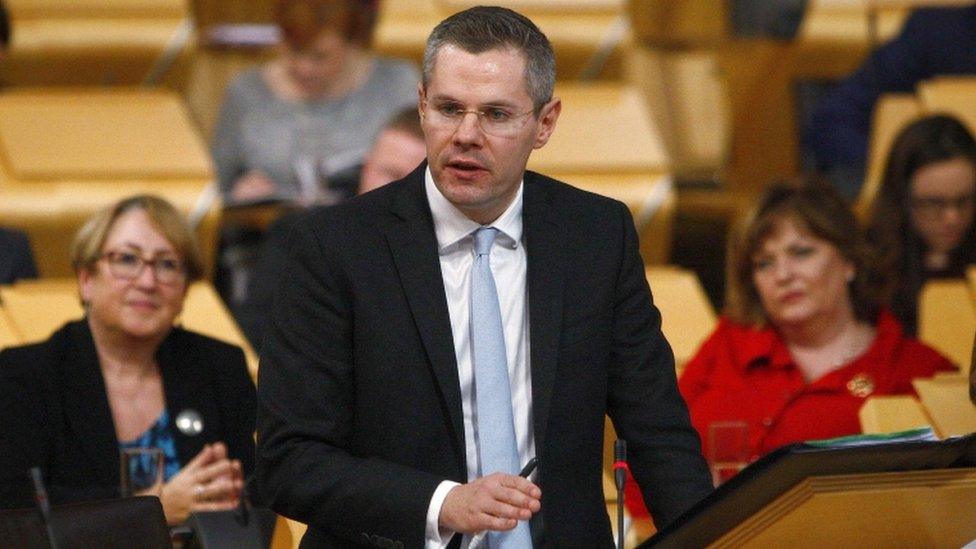Holyrood's committees break down the budget
- Published
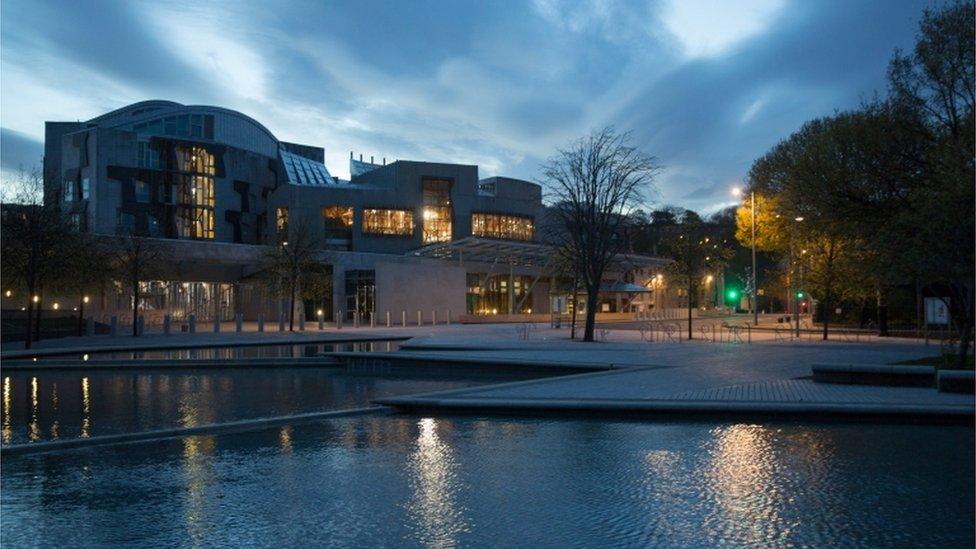
MSPs spent the week before Christmas poring over Derek Mackay's budget proposals
MSPs had a fiscal start to the festive period, with work scrutinising newly published budget proposals continuing right up to the start of the Christmas recess.
There had been complaints that Derek Mackay had not left committees much time to properly scrutinise his first set of tax and spending plans, after he delayed publication until 15 December.
So MSPs immediately got down to work with most of the cabinet facing a committee grilling over funding for their areas in the week before Christmas.
Here are the highlights from the first week of budgetary scrutiny.

Local Government Committee - Derek Mackay
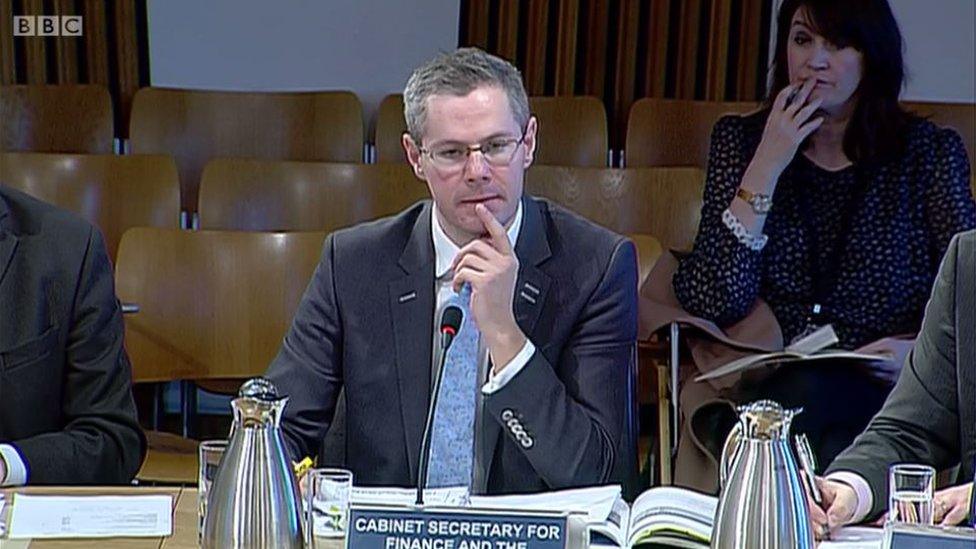
The political flashpoint in the budget was local government finance, so it was fitting that the man who penned it was sent straight to the local government committee.
Mr Mackay repeatedly insisted that he had provided a "fair and reasonable settlement" for local government.
The finance secretary also denied claims of "double counting" in the budget, prompted by the fact £107m of funds for social care used to show a boost in the local services budget are also used to meet a target in the health budget.
The Fraser of Allander Institute economic think tank said the money should only be included under the health line or local government, adding "you cannot have it both ways".
However under questioning from Labour's Elaine Smith, Mr Mackay said: "The position is that the transfer that exists from health to social care is the same as in previous years. There's no double counting in that it's certainly part of local government services."
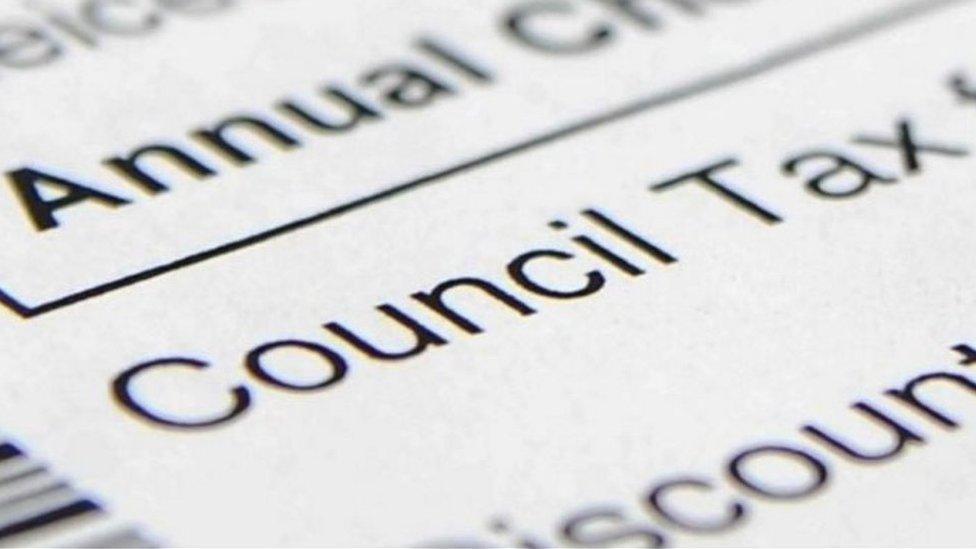
While the core funding for councils falls in the budget, Mr Mackay said the "totality" of funding for local services would rise, with potential council tax rises and ring-fenced funds for health and schools included.
He defended this, saying: "What are communities most interested in? It's the totality of the package to their community. It's what are you investing in schools, what are you investing in social care partnerships."
Committee convener Bob Doris noted that in light of "local services" being funded partly from the local government, education and health budgets, "we're not quite sure who's doing the scrutiny, a consolidated piece of work, on the financial position of local authorities and the support provided to them".
He said: "We need to do better as a parliament on how well we follow the public pound at a local authority level."

Economy Committee - Keith Brown
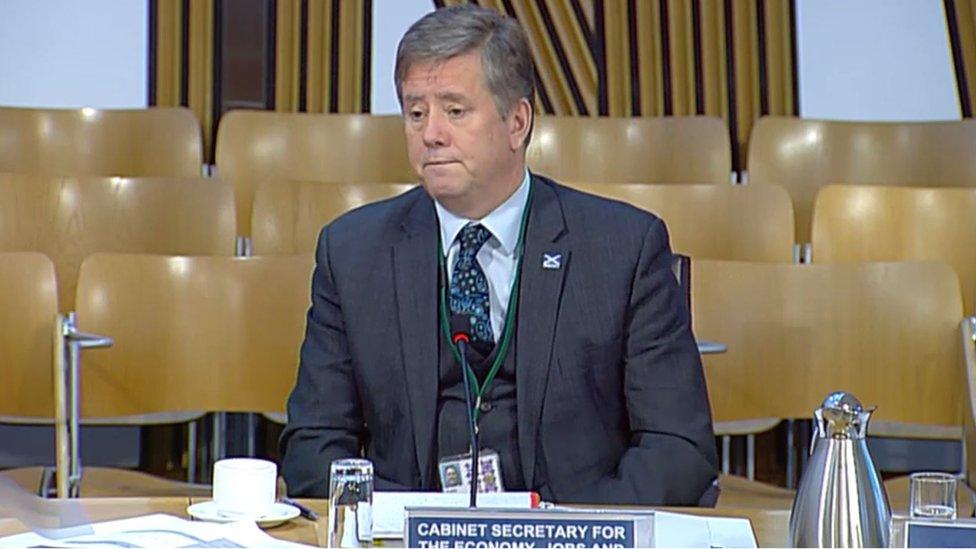
Economy Secretary Keith Brown told MSPs that Scotland "continues to be an attractive country for business growth" in light of the budget proposals.
Much of the questioning from the committee focused on funding for enterprise agencies.
Under examination by Tory Dean Lockhart and Labour's Richard Leonard Mr Brown accepted that money had been moved away from Scottish Enterprise; there was dispute over how much, but Mr Brown said it was "more than made up for" by other enterprise investment.
Adding that "we have to live within our means", Mr Brown highlighted cuts to business rates and an increase in capital investment to conclude that "we have a very strong commitment to enterprise in Scotland".
The budget will also see 100,000 properties exempt from business rates under the small business bonus scheme, which Mr Brown said had been "extremely well received".
He also agreed with convener Gordon Lindhurst that the government should focus on developing trade with countries outwith the EU, in particular with countries like the US, Brazil, Russia, India and China.

Health and Sport Committee - Shona Robison
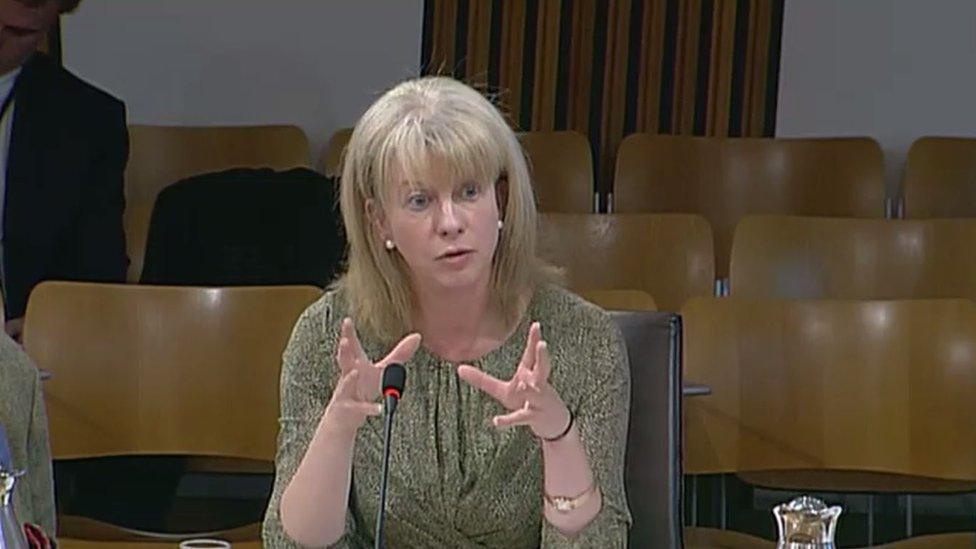
At more than £13bn, the health and sport portfolio is Holyrood's biggest area of direct spending. And due to SNP manifesto commitments, the draft budget included a promised boost for health funding.
Health Secretary Shona Robison said the government had "consistently prioritised" the NHS. However, like her cabinet colleague Mr Mackay, she came under pressure about the "double counting" claims over funds supporting both the health and local authority budgets.
She said: "I don't think there is double counting. We've been clear in our statements that the £107m is allocated to the health budget and then transferred into the new integrated authorities. I don't think that could be clearer."
Director of Health Finance Christine McLaughlin added: "The reflection in local government isn't adding to the value of the settlement, it's showing as another source of funding as it flows through from health. It's only included once in the overall numbers."
Green MSP Alison Johnstone also raised questions over an 8.3% real-terms cut to the sports budget. Ms Robison agreed it was a "tough settlement", and said Sport Scotland should prioritise the delivery of grassroots community sport.

Education Committee - John Swinney
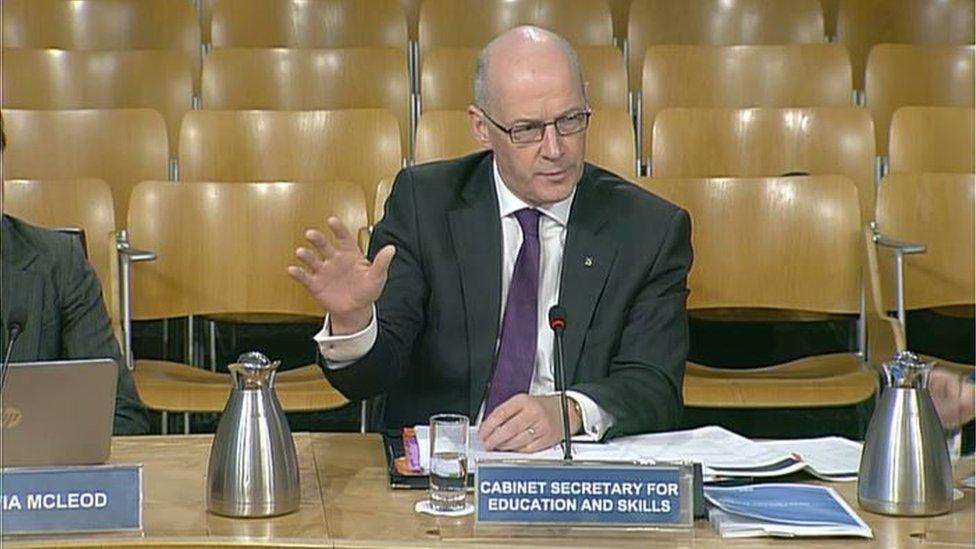
John Swinney, himself a veteran of many budget statements, defended the allocation for schools during his appearance at the education and skills committee.
He was pressed in particular over funding for implementing the Curriculum for Excellence (CfE), which Scottish Parliament Information Centre analysis, external showed was to drop by 49.2% across the SQA, Education Scotland and central government budgets.
Tory MSP Ross Thomson said this cut came during an "intense period of assessment redesign" which needed additional resource. But Mr Swinney said the curriculum and qualifications framework had been developed to "a very advanced stage".
He said: "I think the decisions that we've taken have been robust and clear decisions. I obviously will continue to monitor all of these decisions as we go through the financial year but I'm confident that we've taken a set of decisions that are appropriate for the stage of development of Scottish education."
Labour's Johann Lamont asked about the "huge uncertainty" in the sector and among parents about the reforms.
The deputy first minister said definitive guidance about the delivery of CfE had been issued in August, adding that teachers had told him it was "enormously helpful in simplifying guidance".

Social Security Committee - Jeane Freeman
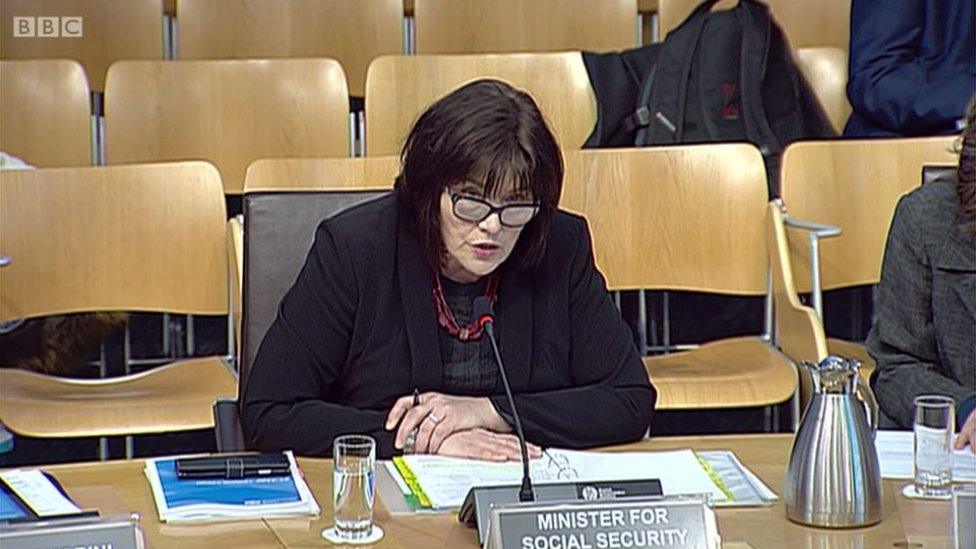
With Scotland setting up its own social security agency to deliver a range of newly devolved benefits, a hefty share of the budget has been committed to that new department.
Social Security Minister Jeane Freeman told MSPs that £80m had been allocated to developing the new Scottish welfare programme.
However, under questioning from Tory Adam Tomkins and Labour's Mark Griffin, she conceded that the £80m would go towards all the new powers devolved under the Scotland Act, not just social security. She said both the Crown Estate and employment support would have a call on some part of the total, and said she would try to clarify this for the committee.
Asked by convener Sandra White if the budget total was likely to change, Ms Freeman said she was "confident and comfortable" that the £80m figure would be sufficient initially.
However she warned that at times all the Scottish government could do was put a "sticking plaster" on UK government policy.

Justice Committee - the Lord Advocate
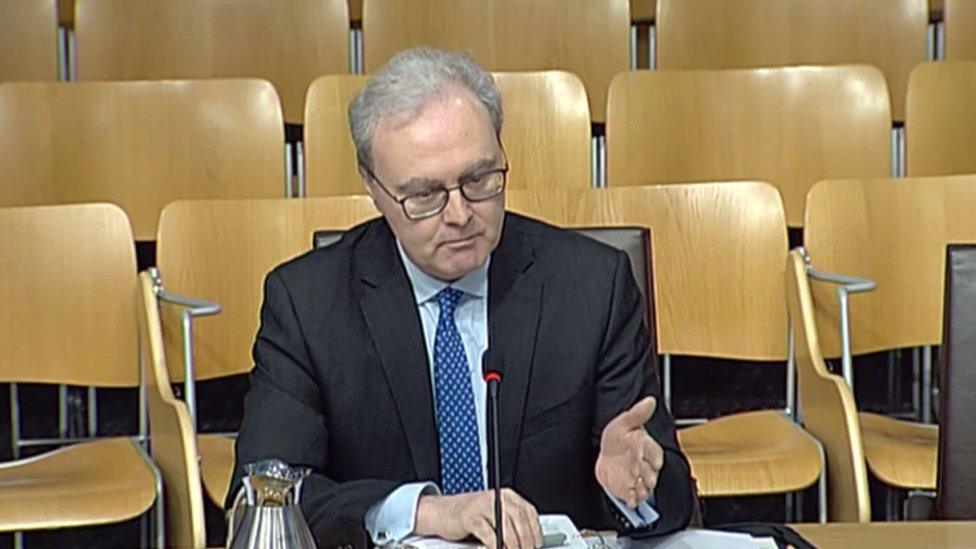
The justice committee took evidence from the government's top law officer, Lord Advocate James Wolffe.
Repeatedly pressed by Conservative justice spokesman Douglas Ross, Mr Wolffe conceded that there had been a real-terms cut to the Crown Office and Procurator Fiscal's Office budget.
Members heard the revenue budget reduction comes in at £1.4m, which service bosses said would be taken 50% from the staff budget and 50% from non-staff costs.
However, when asked if he was left going "cap in hand" to the government for funding, the Lord Advocate said: "Would I like to have more money? There is no head of any public service anywhere in Scotland who would not like to have more by way of resources.
"Can I deliver a prosecution service that fundamentally does the job that it is there to do - to prosecute crime effectively, rigorously and fairly - with the settlement we have achieved? I believe that I can."

Culture, Tourism, Europe and External Affairs Committee - Fiona Hyslop
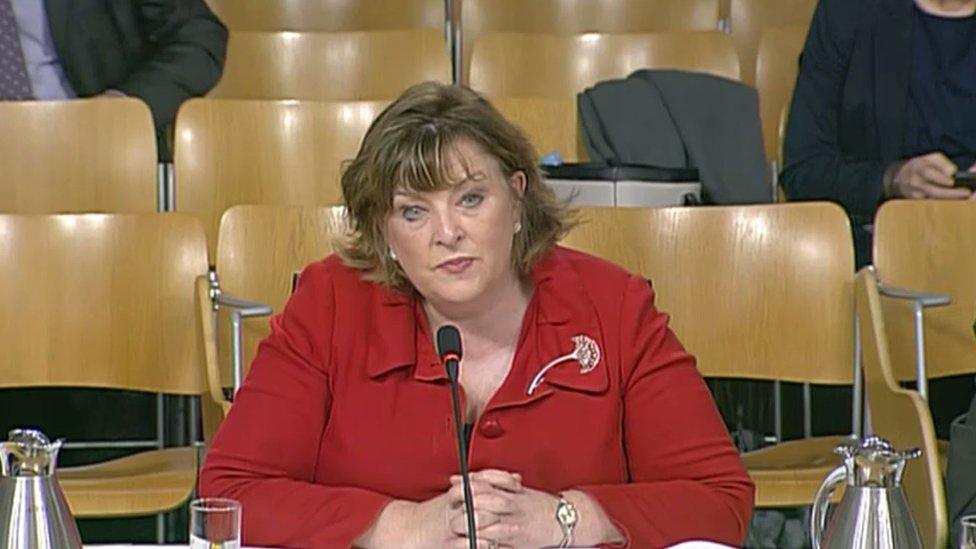
Much of the budgetary questioning for Culture, Tourism and External Affairs Secretary Fiona Hyslop focused on Brexit.
Committee convener Joan McAlpine noted that while the external affairs budget was to rise overall - chiefly due to a rise in humanitarian aid - the European line of the budget was to fall.
Ms Hyslop said this was because there was now a separate budget line for the government's Brussels office, which was where "a great deal of the European strategy funding is now located" with the government "geared up to deal with the consequences" of Brexit.
With cultural funds largely protected, Janet Archer from Creative Scotland told the committee she was "absolutely delighted" with the budget, while Malcolm Roughead from VisitScotland said his group was "delighted with the outcome".
However, as Ms McAlpine pointed out, the schools music budget was cut by £1m. Ms Hyslop said she was "being up front" with the committee: "In order to protect the portfolios for Creative Scotland, VisitScotland, the national collections and the national performing companies, I had to take some reduction somewhere."

Rural Economy and Connectivity Committee - Fergus Ewing
Environment, Climate Change and Land Reform Committee - Roseanna Cunningham
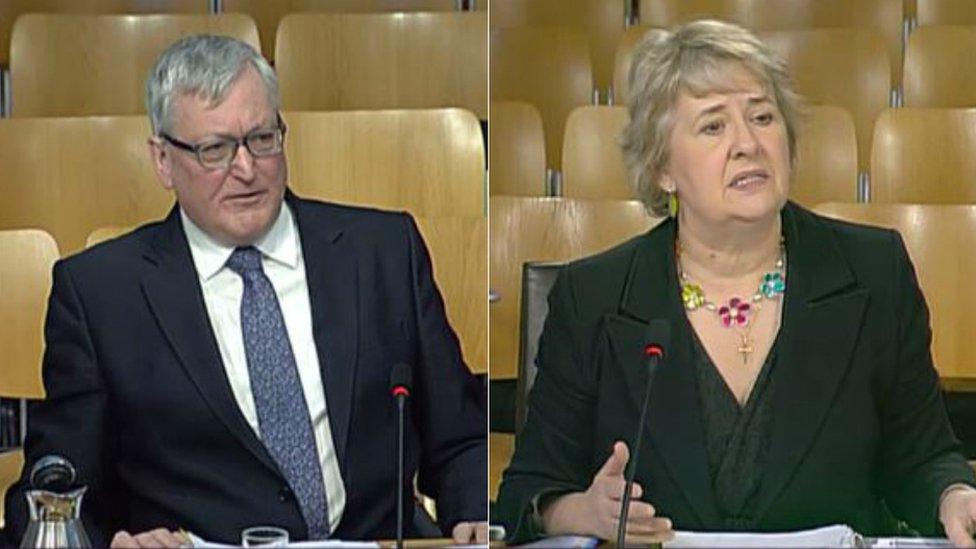
The environment and rural economy budgets both grew in both cash and real terms in the draft budget, according to SPICe.
Rural Economy Secretary Fergus Ewing told MSPs that the key priorities in his area were reforming farm payments, developing the food and drink and forestry sectors, supporting fishing and and improving digital connectivity.
SNP member Gail Ross and Tory Peter Chapman highlighted a real-terms reduction in forestry budgets, which Mr Ewing admitted "has perhaps not received quite the same focus as farming and fishing".
The Scottish government has missed its latest tree-planting targets, and Mr Ewing said he was "determined" to do so in future, committing to "substantial funding to assist plantings".
Lib Dem Mike Rumbles raised the issue of the farm payments IT system, which he said "a heck of a lot of money" was being spent on. Mr Ewing said he was "determined" to ensure that "farmers get their money on time".
Mr Ewing also highlighted a substantial increase in funding for peatland restoration, from £2m to £10m - something which was also praised by Environment Secretary Roseanna Cunningham during a meeting of the environment committee.
Ms Cunningham told members that climate change, flooding and land reform were the key priorities in the environment budget, noting that budgets were "protected" for these areas. She added: "I hesitate to use the word 'increased', because the likelihood of a great deal of extra money suddenly being around is pretty remote."
Scottish Natural Heritage faced funding cuts in the budget, and warned that the UK leaving the EU could have a "significant impact" on their work with the loss of EU funding. Ms Cunningham said there was a "huge question mark over funding right across the board because of Brexit".
- Published19 December 2016

- Published15 December 2016
- Published15 December 2016
